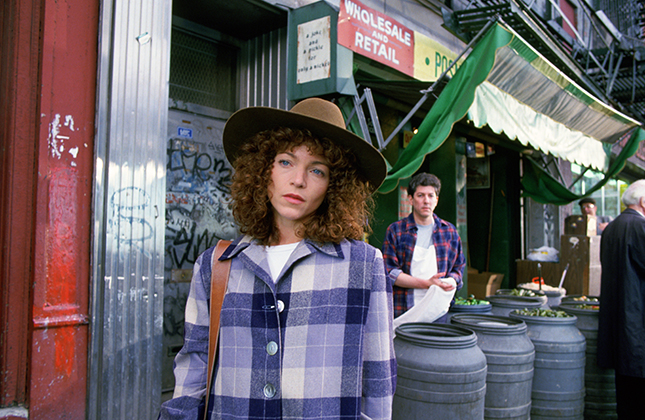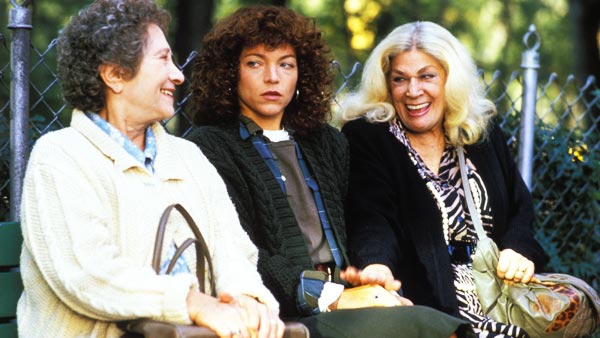
Just in time for Valentine’s Day, here’s the first instalment in my ‘New York State of Mind’ series.
It is a truth universally acknowledged that a Jewish grandmother in possession of an eligible granddaughter and an enterprising disposition must be in want of a grandson-in-law. Such is the tale of Crossing Delancey, Joan Micklin Silver’s film about an independent young woman navigating the labyrinth of life and love in New York—and her grandmother, who is certain she could solve all her granddaughter’s problems if only she would listen.
Isabelle Grossman (Amy Irving) knows exactly what she wants out of life. She works at New Day Books, an Upper West Side staple beloved by the literati, has an address book full of famous writers and organises the most prestigious literary talk series in the city. She is confident and articulate, but also capable of being star struck: Dutch wunderkind Anton Maes (Jeroen Krabbé) always leaves her flustered. Izzy spends half her time uptown in the world of publishing or with her close circle of friends. The other half she spends downtown with her Bubbie, Mrs. Kantor (Reizl Bozyk), who lives on the Lower East Side, near Delancey Street. Bubbie is a stereotypical Jewish grandmother: loving, playful, insistent, with no conception of personal boundaries. She doesn’t meddle in Izzy’s life; she improves it.
Bubbie takes Izzy to a nearby park, which proves to be an ambush. She’s arranged for the local marriage broker, Mrs. Mandelbaum (Sylvia Miles), to join them and Izzy ends up sandwiched between the two women as they discuss her prospects. Satisfied that she is of a good family, Mrs. Mandelbaum asks Izzy if she has her own apartment. “No!” Bubbie answers, drawing the vowel out like a lament. “She lives alone in a room, like a dog.” Izzy actually lives in a respectable, rent-controlled one-bedroom apartment—the dream of many young New Yorkers—and objects, vehemently. Bubbie and Mrs. Mandelbaum ignore her. When they finally go back to Bubbie’s home, Izzy boils over: she is a modern woman with an enviable career and Isaac Bashevis Singer’s private number. She does not need a man to complete her. But Bubbie is adamant. She wants Izzy to settle down with a nice, preferably Jewish, boy and Mrs. Mandelbaum has a candidate: enter Sam Posner (Peter Riegert), the pickle man.
Crossing Delancey, based on Susan Sandler’s play (she also wrote the script), is that rare marvel, a record of a particular time, place and people that succeeds in being both specific and universal. It’s also one that Micklin Silver struggled to make: studio executives kept turning her down, telling her the film was too Jewish to appeal to a general audience. There will always be grandmothers like Bubbie Kantor, convinced that they know best. And there will always be women like Izzy, who want to love and be loved on their own terms.
At first glance, Sam is everything Izzy is not. A traditionalist who sells pickles at a shop he inherited from his father, he seems provincial, even parochial. Their initial meeting—conducted under the watchful eyes of Bubbie and Mrs. Mandelbaum—is disastrous. Izzy barely says a word and rejects him at the first opportunity. He leaves, bruised but hopeful. Still, he isn’t her type. Izzy has a troubling tendency to fall for exploitative men. Her attraction to Anton is understandable; he woos her with Confucius over lunch. What she ever saw in the boorish Nick (John Bedford Lloyd), who turns up on her doorstep whenever he needs something, isn’t clear.
Anton praises Izzy for her stillness in comparison with his own “jangling intensity”, but Izzy is far from still. She’s constantly moving and, when it comes to Sam, constantly indecisive. He courts her with the gift of a new hat, a gentle reminder that change is good from time to time. She goes to his shop to thank him, but rejects him again so clumsily she ends up insulting him. Next she apologises and invites him out to dinner, only to offend him further by using the date as an excuse to set him up with one of her friends, Marilyn (Suzzy Roche, who also sings on the film’s soundtrack as one of The Roches). Izzy is skittish but Sam is still. And though he isn’t without pride, he is also patient. Izzy is a woman worth waiting for.
The cast is excellent. Amy Irving imbues Izzy with a warmth and grace which shine through, even when she is self-centred or careless. Peter Riegert plays Sam with wit and sincerity, conveying a great deal with small gestures and glances. A young David Hyde Pierce gets several laughs as Izzy’s fussy colleague, Mark, and Jeroen Krabbé caresses his lines as Anton, playing the kind of cad rarely seen on screen since George Sanders. Best of all is Reizl Bozyk, who steals half the film, armed with banter for every occasion (rising awkwardly from the sofa: “Oh the pain. The pain only my enemies should know.”).
Crossing Delancey is a delight, funny, beguiling and wise. Love can be waiting for you anywhere, even in the pickle shop down the street. Listen to your grandmother. She knows these things.

Love this film! But remarkable that nowhere in your piece do you credit the delicious screenplay by Susan Sandler and her play “Crossing Delancey” on which the film is based. Quoting lines from Sandler’s screenplay, but not acknowledging her as the creator of the story, characters, and script whose world the film is clearly based upon is an oversight.
Hello Sophie, you’re quite right. I’ll rectify that immediately. Thanks for your comment.